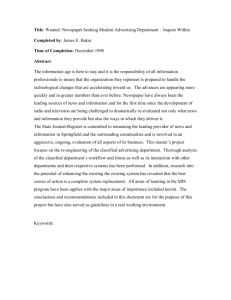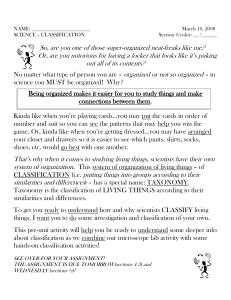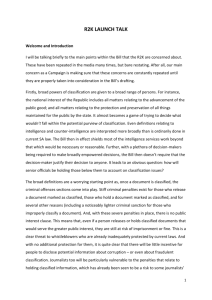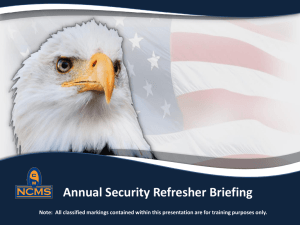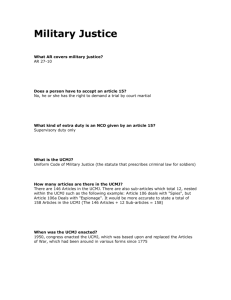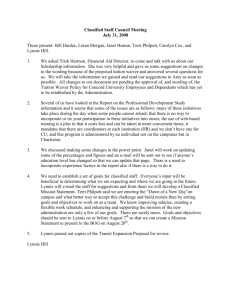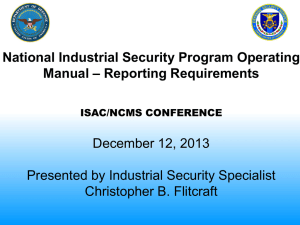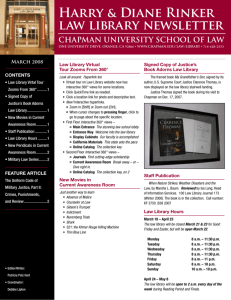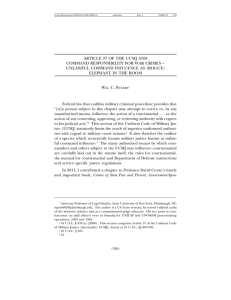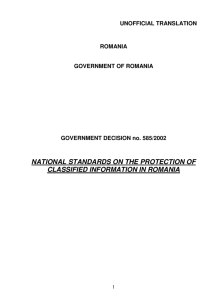OPSEC General Order
advertisement
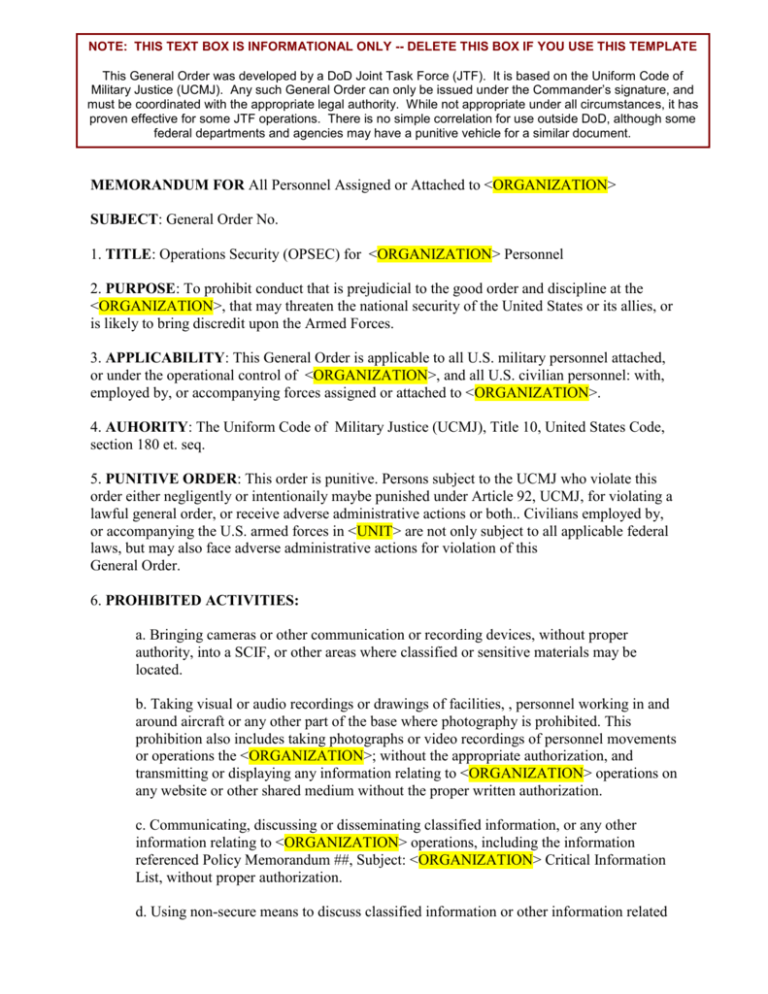
NOTE: THIS TEXT BOX IS INFORMATIONAL ONLY -- DELETE THIS BOX IF YOU USE THIS TEMPLATE This General Order was developed by a DoD Joint Task Force (JTF). It is based on the Uniform Code of Military Justice (UCMJ). Any such General Order can only be issued under the Commander’s signature, and must be coordinated with the appropriate legal authority. While not appropriate under all circumstances, it has proven effective for some JTF operations. There is no simple correlation for use outside DoD, although some federal departments and agencies may have a punitive vehicle for a similar document. MEMORANDUM FOR All Personnel Assigned or Attached to <ORGANIZATION> SUBJECT: General Order No. 1. TITLE: Operations Security (OPSEC) for <ORGANIZATION> Personnel 2. PURPOSE: To prohibit conduct that is prejudicial to the good order and discipline at the <ORGANIZATION>, that may threaten the national security of the United States or its allies, or is likely to bring discredit upon the Armed Forces. 3. APPLICABILITY: This General Order is applicable to all U.S. military personnel attached, or under the operational control of <ORGANIZATION>, and all U.S. civilian personnel: with, employed by, or accompanying forces assigned or attached to <ORGANIZATION>. 4. AUHORITY: The Uniform Code of Military Justice (UCMJ), Title 10, United States Code, section 180 et. seq. 5. PUNITIVE ORDER: This order is punitive. Persons subject to the UCMJ who violate this order either negligently or intentionaily maybe punished under Article 92, UCMJ, for violating a lawful general order, or receive adverse administrative actions or both.. Civilians employed by, or accompanying the U.S. armed forces in <UNIT> are not only subject to all applicable federal laws, but may also face adverse administrative actions for violation of this General Order. 6. PROHIBITED ACTIVITIES: a. Bringing cameras or other communication or recording devices, without proper authority, into a SCIF, or other areas where classified or sensitive materials may be located. b. Taking visual or audio recordings or drawings of facilities, , personnel working in and around aircraft or any other part of the base where photography is prohibited. This prohibition also includes taking photographs or video recordings of personnel movements or operations the <ORGANIZATION>; without the appropriate authorization, and transmitting or displaying any information relating to <ORGANIZATION> operations on any website or other shared medium without the proper written authorization. c. Communicating, discussing or disseminating classified information, or any other information relating to <ORGANIZATION> operations, including the information referenced Policy Memorandum ##, Subject: <ORGANIZATION> Critical Information List, without proper authorization. d. Using non-secure means to discuss classified information or other information related to <ORGANIZATION> operations. e. Transfering classified information or disks to lower-classified or unclassified medium, network or computer. f. Discussing classified matters, work related matters, or operational matters with anyone who does not have the appropriate clearance and the need to know said information or in the presence of anyone that does not have the appropriate clearance and need to know. g. Transporting classified information without the proper locking containers or covers, leaving computer terminals or classified material unattended and unlocked. h. The improper marking of information, taking classified materials to a housing unit, sharing or revealing computer access user names and passwords. Misplacing or leaving personnel rosters, access badges, or computer access user names and passwords, and classified materials unattended. i. Failing to immediately disclose to the chain of command any information concerning sabotage, terrorist activity, subversive activities that may pose a direct threat to U.S. personnel, requests by anyone for illegal or unauthorized access to classified or sensitive information, contact with an individual whom you have reason to believe is targeting you for exploitation. j. Taking a person to any area for which they do not possess the required clearance without authorization or a mission related purpose, or leaving a person unattended in any area where they are not authorized to be unattended. k. Accessing, downloading, installing, or storing unauthorized internet sites or other unauthorized materials, software, or programs on any ADPE or <MWR> computer without the express written approval of the <ORGANIZATION>/<COMM OFFICER>. l. Leaving your computer system logged in and unattended without properly locking the terminal, using a private computer to process government related work, or plugging any private computer (non-government computer) into the <ORGANIZATION> or <MWR> networks without the express prior written authorization from <ORGANIZATION>/<COMM OFFICER>. m. Forwarding chain mail or virus warnings. Failing to immediately report the discovery of a virus or virus warning. n. The improper use of another person's identity or computer account. Masking, or attempting to hide, a user's identity while using the <ORGANIZATION> computer network system. o. Connecting or allowing the connection of both a network interface card and modem to a <ORGANIZATION> computer at the same time. Connecting or allowing to be connected any hardware or software not provided or authorized by <ORGANIZATION>/<COMM OFFICER>. 7. INDIVIDUAL DUTY: All persons subject to this General Order are charged with the duty to become familiar with this General Order. All personnel shall avoid action, whether or not specifically prohibited in this General Order, which might result in or reasonably be expected create the appearance of a violation of this general Order or other law under the UCMJ, or which by its very nature might compromise the security of the <ORGANIZATION>. 8. UNIT COMMANDER RESPONSIBILITIES: Unit commanders and supervisors are to ensure that all personnel are briefed on the contents of this General Order, that personnel understand that they have a duty to report any violations of this order either to their supervisor or to the Staff Judge Advocate, and that it is posted on read boards in common areas through the unit. EFFECTIVE DATE: This General Order is effective immediately, <DATE>. <UNIT> SUBJECT: General Order No EXPIRATION: This General Order will expire when rescinded by <Commander>, or higher authority, or upon redeployment from <Organization>. WAIVER REQUESTS: Requests to waive prohibitions of this General Order must be coordinated with the Staff Judge Advocate and can only be approved by <Commander>. My point of contact for this General Order is the OPSEC Program Manager, <Rank & Name>.
